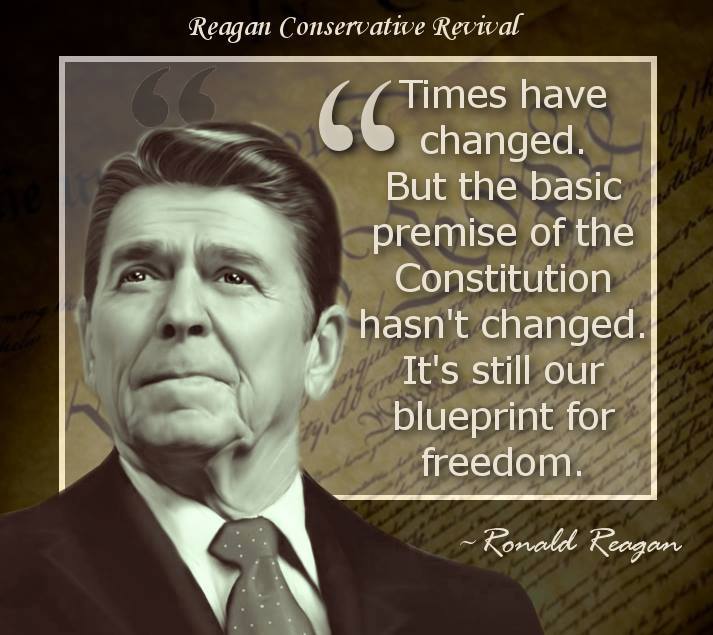Times have changed. But the basic premise of the Constitution hasn’t changed. It’s still our blueprint for freedom. ~ Ronald Reagan
Remarks at the Bicentennial Celebration of the United States Constitution
September 16, 1987
When George Washington was elected as the first President of the United States, the total population of the country was nearly 4 million. Today there are over 5 million Federal employees. Times have changed. But the basic premise of the Constitution hasn’t changed. It’s still our blueprint for freedom. One of our more able statesmen and constitutional lawyers, Daniel Webster, once wrote: “We may be tossed upon an ocean where we can see no land nor, perhaps, the Sun or stars. But there is a chart and a compass for us to study, to consult, and obey. The chart is the Constitution.”
Two hundred years ago the very notion of free self-government was a new idea. But James Madison, a man whom many call the Father of the Constitution, urged his fellow citizens not to oppose the idea simply because it was new. He argued that it was the glory of the American people that they were not blindly bound to the past but were willing to rely on “their own good sense” and experience in charting the future. It’s interesting that Madison and others had to defend the Constitution because it was new. Times have changed. For over 200 years we’ve lived with freedom under law, and perhaps, we’ve become complacent about it. We should never forget how rare and precious freedom is.
Active and informed citizens are vital to the effective functioning of our constitutional system. All of us have an obligation to study the Constitution and participate actively in the system of self-government that it establishes. This is an obligation we owe, not only to ourselves but to our children and their children. And there is no better time than right now, during the next 4 years of the bicentennial, to rededicate ourselves to the Constitution and values it contains.
Let us never forget that the signers of the Declaration of Independence acted with “a firm reliance on the protection of divine providence.” One hundred years ago, on the occasion of the centennial of the Constitution, another President, Grover Cleveland, accepted the privilege that I have been given here today: to honor the Constitution. And his words are as true now as they were then. He said: “When we look down upon 100 years and see the origin of our Constitution, when we contemplate all its trials and triumphs, when we realize how completely the principles upon which it is based have met every national need and national peril, how devoutly should we say with Franklin `God governs in the affairs of men.”’
And now, Stephanie, Damien, Brian, Tyese, would you join me and everybody here and everybody watching and listening throughout the land as we recite the words that we all know by heart: the Pledge of Allegiance.
Note: The President spoke at 2 p.m. on the steps of the U.S. Capitol. Following his remarks, he recited the Pledge of Allegiance with Stephanie Petit, winner of the National Spelling Bee; Damien Atkins, District of Columbia honor student; and Brian Morris and Tyese Wright, Gallaudet University students.

Sorry, the comment form is closed at this time.